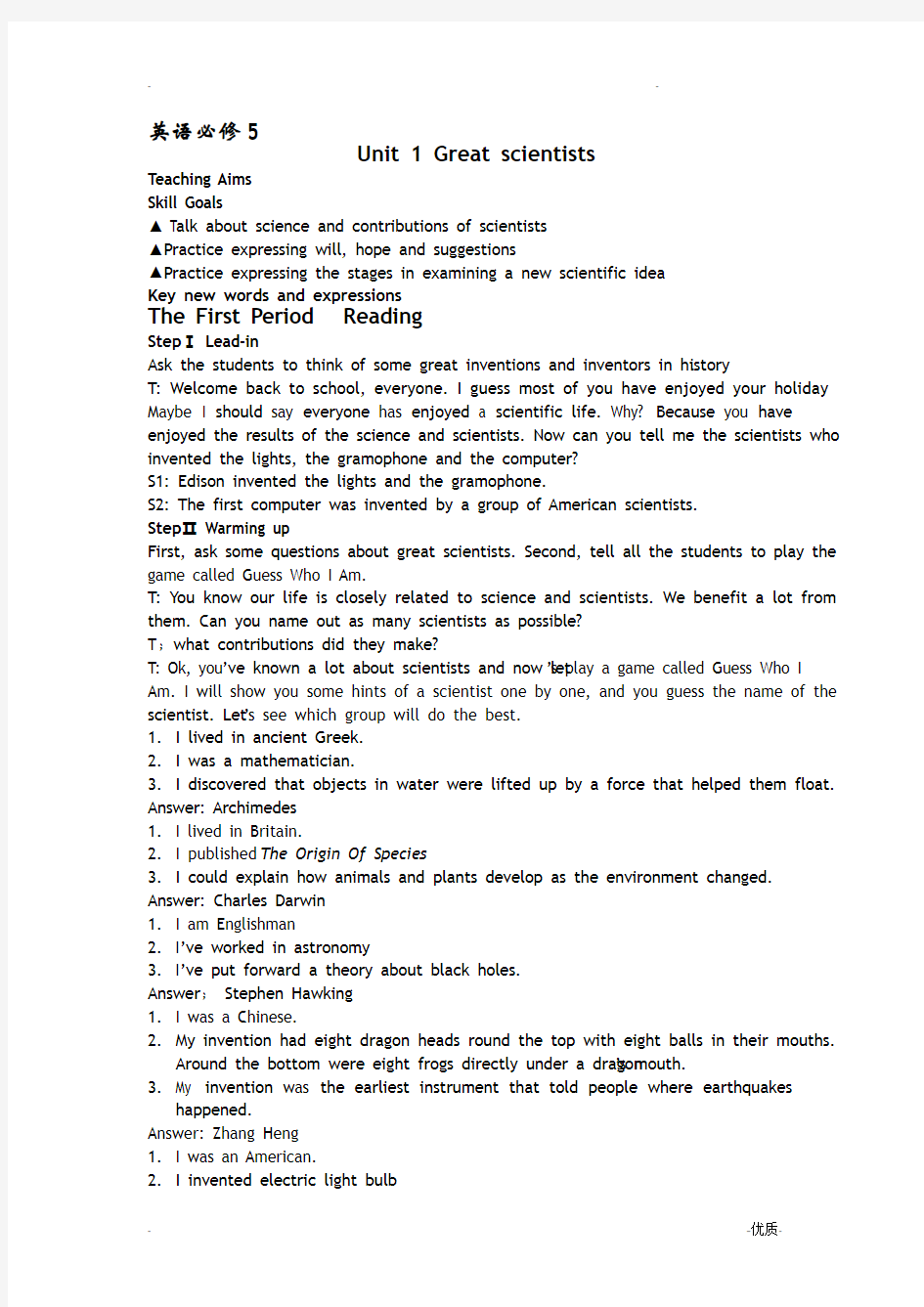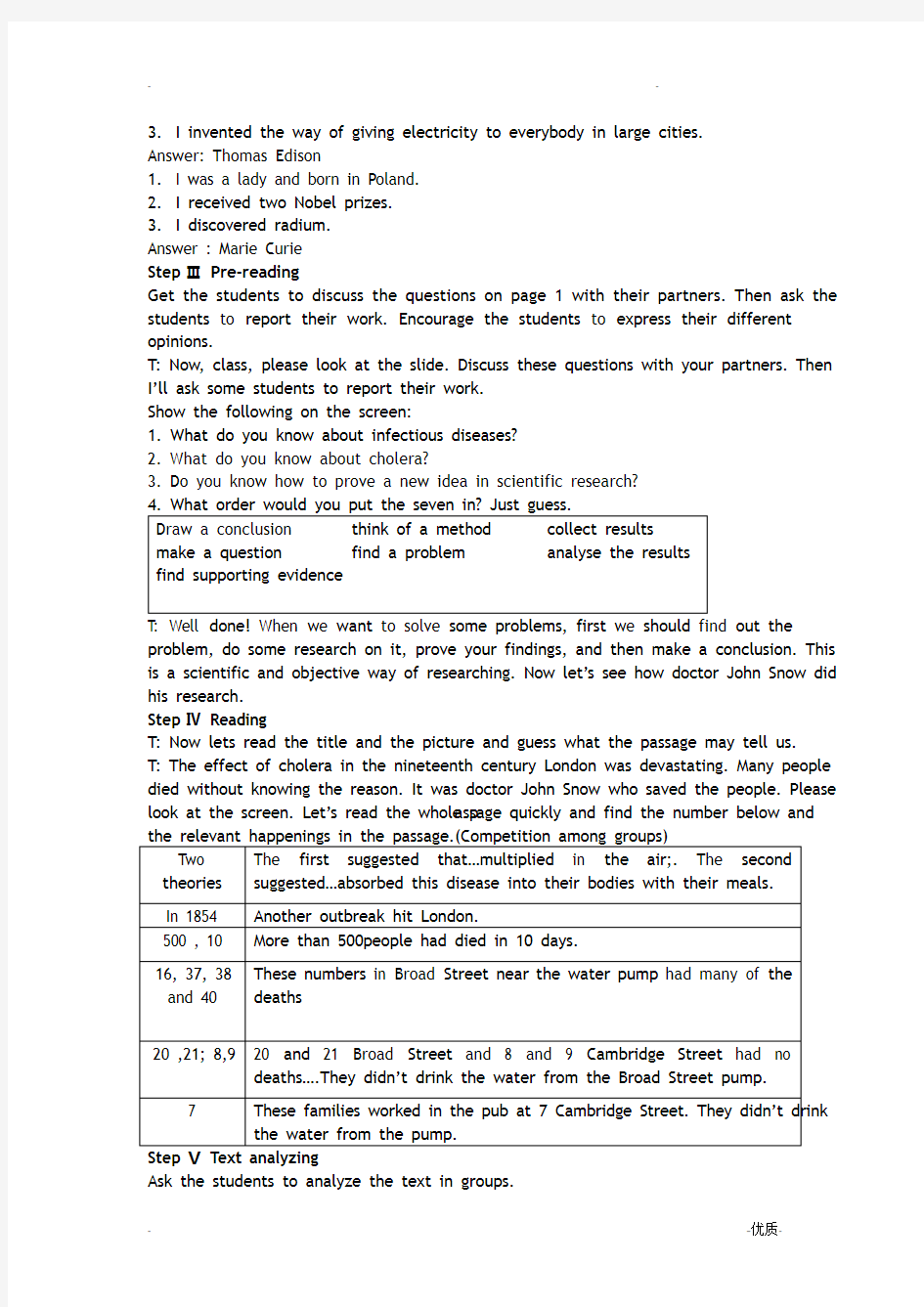人教版高中英语必修五全套教案


英语必修5
Unit 1 Great scientists
Teaching Aims
Skill Goals
▲ T alk about science and contributions of scientists
▲Practice expressing will, hope and suggestions
▲Practice expressing the stages in examining a new scientific idea
Key new words and expressions
The First Period Reading
StepⅠ Lead-in
Ask the students to think of some great inventions and inventors in history.
T: Welcome back to school, everyone. I guess most of you have enjoyed your holiday. Maybe I should say everyone has enjoyed a scientific life. Why? Because you have enjoyed the results of the science and scientists. Now can you tell me the scientists who invented the lights, the gramophone and the computer?
S1: Edison invented the lights and the gramophone.
S2: The first computer was invented by a group of American scientists.
StepⅡ Warming up
First, ask some questions about great scientists. Second, tell all the students to play the game called Guess Who I Am.
T: You know our life is closely related to science and scientists. We benefit a lot from them. Can you name out as many scientists as possible?
T;what contributions did they make?
T: Ok, you’ve known a lot about scientists and now let’s play a game called Guess Who I Am. I will show you some hints of a scientist one by one, and you guess the name of the scientist. Let’s see which group will do the best.
1.I lived in ancient Greek.
2.I was a mathematician.
3.I discovered that objects in water were lifted up by a force that helped them float. Answer: Archimedes
1.I lived in Britain.
2.I published The Origin Of Species.
3.I could explain how animals and plants develop as the environment changed. Answer: Charles Darwin
1.I am Englishman
2.I’ve worked in astronomy.
3.I’ve put forward a theory about black holes.
Answer;Stephen Hawking
1.I was a Chinese.
2.My invention had eight dragon heads round the top with eight balls in their mouths.
Around the bottom were eight frogs directly under a dragon’s mouth.
3.My invention was the earliest instrument that told people where earthquakes
happened.
Answer: Zhang Heng
1.I was an American.
2.I invented electric light bulb
3.I invented the way of giving electricity to everybody in large cities.
Answer: Thomas Edison
1.I was a lady and born in Poland.
2.I received two Nobel prizes.
3.I discovered radium.
Answer : Marie Curie
Step Ⅲ Pre-reading
Get the students to discuss the questions on page 1 with their partners. Then ask the students to report their work. Encourage the students to express their different opinions.
T: Now, class, please look at the slide. Discuss these questions with your partners. Then I’ll ask some students to report their work.
Show the following on the screen:
1. What do you know about infectious diseases?
2. What do you know about cholera?
3. Do you know how to prove a new idea in scientific research?
out the problem, do some research on it, prove your findings, and then make a conclusion. This is a scientific and objective way of researching. Now let’s see how doctor John Snow did his research.
Step Ⅳ Reading
T: Now lets read the title and the picture and guess what the passage may tell us.
T: The effect of cholera in the nineteenth century London was devastating. Many people died without knowing the reason. It was doctor John Snow who saved the people. Please look at the screen. Let’s read the whole p assage quickly and find the number below and
Ask the students to analyze the text in groups.
T: Please look at the chart on the screen. The chart shows that each paragraph of the text explains John Snow’s stages in his research. Please read the text and find out the general idea of each paragraph and match the stage with each paragraph. Discuss it in
T: Here are three pieces of writing. They belong to different writing styles. Now read and find out what style each piece belongs to.
Encourage the students to get the general ideas of the passages.
T: In the last period, we have learned about how Doctor John Snow used seven stages to prove his conclusion and fulfilled his research. This period we will also deal with a scientific report. Please read the passage quickly and try to answer the questions on the screen.
Show the questions on the screen.
1. What’s Copernicus’ fear?
2. How did Copernicus prove his theory?
3. What is his theory?
Step Ⅳ Further-reading
This time the students are encouraged to read the two passages carefully and then do
the exercises and problems on pages 7.
T: Now class. Please read the passage again. And finish EX 1 and then discuss the questions on the screen in groups.
As a scientist, one should be brave. But Copernicus was afraid of being attacked by the Christian Church. So he had hidden his theory for so many years. What do you think of this?
Sample answers:
Q1: 1.I think Copernicus was very coward. He should speak out his discovery and let the world know the truth earlier.
2.I don’t agree with you. He was more cautious than coward. If he had published his ideas, he would have been killed just as Bruno who was burnt to death because his theory was against the Christ ian Church’s.
T: I quite agree with you. And I am glad you have known so much about the science. StepⅤ Language Points
And then write the following sentences on the blackboard; ask the students to pay attention to the past participle. Guide them to find out their functions in the sentences. Show the following on the screen.
1. Nicolas Copernicus was frightened and his mind was confused.
2. He placed a fixed sun at the center of the solar system ...
3. He joined these points together using curved lines ...
T: Please read the three sentences and tell me what parts of speech the past participles are acting as.
Step Ⅵ Homework
1. Search on the Internet for more information about Copernicus and Euler.
2. Prepare for the language study, reviewing the words and expressions in this unit.
The Third Period Language Study
StepⅠRevision and Lead-in
T ask 1: Ask the students to turn to pages 4 and 42 and do Exercise 1. And then check the answers.
T ask 2: Ask the students to read and understand the explanations in Exercise 2 on page 4.
T: Very good! Can you put the verb “make” with a noun to form a “predicate + object” ph rase? For example: “making a mistake” instead of “to mistake”.
Sample answers:
S: “make an agreement”, “make an admission”, “make an apology”.
T: Well done! Please find and collect as many examples as you can as homework. Next period I’ll check your work.
T ask 4: Ask the students to do Exercises 3 on page 43 and then check the answers. Step Ⅱ Practice
T ask 1: Enable the students to do the following exercises.
T: Please look at the screen and put them into English using “make + n” and past participles.
Show the following on the screen:
Step Ⅲ Grammar
Explain the usage of the past participles as predicative and attribute.
Unit 2 The United Kingdom
Ⅰ. Teaching Aims
Skill Goals
▲ T alk about the United Kingdom
▲ T alk about language difficulties in communication
Ⅱ. Language Goals
The past participle as the object complement ... the three countries found themselves united peacefully ...
However, just as they were going to get Ireland connected to form ...
You find most of the population settled in the South, ... .
1. Now when people refer to England you find Wales included as well. P9
2. However, the southern part of Ireland was unwilling and broke away to form its own government. P10
3. The greatest historical treasure of all is London with its museums, art collections, theatres, parks and buildings. P10
4. You must keep your eyes open if you are going to make your trip to the United Kingdom enjoyable and worthwhile! P10
5. Her first delight was going to the T ower.
P14
6. There followed St Paul’s Cathe dral built after the terrible fire of London in 1666. P14
7. That is why, even today, when people can follow any religion they like, families still have firework parties and burn cloth dolls of Guy Fawkes on a bonfire. P52
The First Period Reading
Teaching goals
1. Target language
a. Key words and expressions
unite, kingdom, consist, divide, puzzle, clarify, relation, legal, convenience, attraction, collection, construct, influence, consist of, divide ... into, break away (from), leave out
b. Key sentences
1. Now when people refer to England you find Wales included as well. P10
2. However, the southern part of Ireland was unwilling and broke away to form its own government. P10
3. You must keep your eyes open if you are going to make your trip to the United Kingdom worthwhile! P10
2. Ability goals
Enable the students to learn about the United Kingdom (the UK).
3. Learning ability goals
Enable the students to know the UK in geography and history.
T eaching important & difficult points
How to understand the geographic puzzle of the UK.
T eaching methods
Skimming and task-based activities.
T eaching aids
A recorder, a computer and a projector.
T eaching procedures & ways
Step ⅠLead-in
T ask 1: Free talk about the topic: The United Kingdom.
Reference topic:
1. Have you ever been to the UK? If you have, can you tell us something about it or can you tell us something about your visit(s) there? Or what is your impression of the UK? If you haven’t, where can you get the information about it?
2. What is the capital of the UK? And what is the language?
Step II Pre-reading
Step III While-reading
T ask 1: Ask the students to describe briefly the UK according to the following map.
A sample description:
1. Look through the passage as fast as possible;
2. Try to find the answers to the questions given in the Comprehending.
Sample answers:
S1: Wales, for we can’t find any pattern of flag of Wales and it is usually assumed to be part of England.
S2: It represents England, Scotland and Northern Ireland.
S3: The Vikings. They only influenced the vocabulary and the place names of the North. Task 4: Skimming
T: Please skim the passage to get the general idea of the whole passage. While reading, please try to divide the whole passage into proper parts and find out the main idea of each part (helping the students fulfill the task if necessary).
Sample answers:
Part 1 (Para. 1-2): What England includes; about Great Britain; the UK.
Part 2 (Paras. 3-4): The geographic division of England into zones, their similarities and differences.
Part 3 (Para. 5-6) : The cultural importance of London.
T: Then how do you understand the title of the text Puzzles in Geography? Are there really any puzzles in geography of the UK? If so, what are they? If not, why does the writer use “Puzzles in Geography” as the title? Get the students to discuss about it in pairs.
Then ask the students to fill in the following form.
